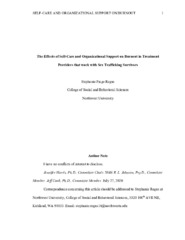| dc.contributor.advisor | Harris, Jennifer | en |
| dc.contributor.author | Regus, Stephanie Paige | en |
| dc.date.accessioned | 2021-11-22T20:04:31Z | |
| dc.date.available | 2021-11-22T20:04:31Z | |
| dc.date.issued | 2020-07-27 | en |
| dc.identifier.uri | archives.northwestu.edu/handle/nu/57638 | |
| dc.identifier.uri | archives.northwestu.edu/handle/nu/57638 | en |
| dc.description.abstract | Mental healthcare providers that work with survivors of sex trafficking are at high risk for burnout, which not only impacts the individual but can have negative effects on the organization and the population they serve. This study explored the organizational factors and personal self-care characteristics that may contribute to levels of burnout. The first aim of this study was to examine whether self-care practices predicted burnout. The second aim of this study was to determine whether organizational factors predicted burnout. And the final aim of this study was to observe whether organizational factors moderated the relationship between self-care and burnout. Surveys were completed by 118 mental health providers across organizations that serve sex trafficking survivors in the United States, Canada, and the United Kingdom. Self-care was defined by assessing participants' dispositional mindfulness, sleep, exercise habits, and perceived social support. Results indicated that of the self-care variables mindfulness was the strongest predictor of emotional exhaustion and depersonalization. Findings suggest that a high workload and a sense of control in the workplace were the strongest predictors of emotional exhaustion and personal accomplishment. Furthermore, a sense of community was shown to predict emotional exhaustion. On the moderation level, organizational support was shown to moderate the relationship between self-care and emotional exhaustion. Implications of this study suggest that agencies may be able to improve organizational functioning through promoting mindfulness, creating a positive workplace culture, and implementing strategies to alleviate work overload. | en |
| dc.format.extent | 70 pages | en |
| dc.format.medium | PDF | en |
| dc.language.iso | en | en |
| dc.publisher | Northwest University | en |
| dc.rights | This original work is protected by copyright. Copyright is retained by the author(s). Works may be viewed, downloaded, or printed, but not reproduced or distributed without author(s) permission. | en |
| dc.rights.uri | http://archives.northwestu.edu/page/copyright | en |
| dc.subject | Self-care, Health | en |
| dc.subject | Human trafficking | en |
| dc.subject | Medical personnel | en |
| dc.subject | Burn out (Psychology) | en |
| dc.title | The Effects of Self-Care and Organizational Support on Burnout in Treatment Providers that work with Sex Trafficking Survivors | en |
| thesis.degree.name | Doctor of Psychology in Counseling Psychology | en |
| thesis.degree.level | Doctoral | en |
| thesis.degree.grantor | Northwest University | en |
| thesis.degree.discipline | College of Social and Behavioral Sciences | en |


 Maintained by the Northwest University Library
Maintained by the Northwest University Library